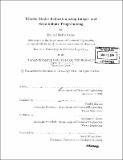Kinetic model reduction using integer and semi-infinite programming
Author(s)
Bhattacharjee, Binita, 1976-
DownloadFull printable version (5.027Mb)
Other Contributors
Massachusetts Institute of Technology. Dept. of Chemical Engineering.
Advisor
Paul I. Barton and William H. Green.
Terms of use
Metadata
Show full item recordAbstract
In this work an optimization-based approach to kinetic model reduction was studied with a view to generating reduced-model libaries for reacting-flow simulations. A linear integer formulation of the reaction elimination problem was developed in order to allow the model reduction problem to be solved cheaply and robustly to guaranteed global optimality. When compared with three other conventional reaction-elimination methods, only the integer-programming approach consistently identified the smallest reduced model which satisfies user-specified accuracy criteria. The proposed reaction elimination formulation was solved to generate model libraries for both, homogeneous combustion systems, and 2-D laminar flames. Good agreement was observed between the reaction trajectories predicted by the full mechanism and the reduced model library. For kinetic mechanisms having many more reactions than species, the computational speedup associated with reaction elimination was found to scale linearly with the size of the derived reduced model. Speedup factors of 4-90 were obtained for a variety of different mechanisms and reaction conditions. The integer-programming based reduction approach was tested successfully on large-scale mechanisms comprising up to [approximately] 2500 reactions. The problem of identifying optimal (maximum) ranges of validity for point-reduced kinetic models was also investigated. A number of different formulations for the range problem were proposed, all of which were shown to be variants of a standard semi-infinite program (SIP). Conventional algorithms for nonlinear semi-infinite programs are essentially all lower-bounding methods which cannot guarantee the feasibility of an incumbent at finite termination. (cont.) Thus, they cannot be used to identify rigorous ranges of validity for reduced kinetic models. In the second part of this thesis, inclusion functions were used to develop an inner approximation method which generates a convergent series of feasible upper bounds on the minimum value of a smooth, non-linear semi-infinite program. The inclusion-constrained reformulation approach was applied successfully to a number of test problems in the SIP literature. The new upper-bounding approach was then combined with existing lower-bounding methods in a branch-and-bound framework which allows smooth nonlinear semi-infinite programs to be solved finitely to [epsilon]-optimality. The branch-and-bound algorithm was also tested on a number of small literature examples. In the final chapter of the thesis, extensions of the existing algorithm and code to solve practical engineering problems, including the range identification problem, were considered.
Description
Thesis (Ph. D.)--Massachusetts Institute of Technology, Dept. of Chemical Engineering, February 2004. MIT Science Library copy in pages. Also issued in pages. Includes bibliographical references (leaves 147-155).
Date issued
2004Department
Massachusetts Institute of Technology. Department of Chemical EngineeringPublisher
Massachusetts Institute of Technology
Keywords
Chemical Engineering.